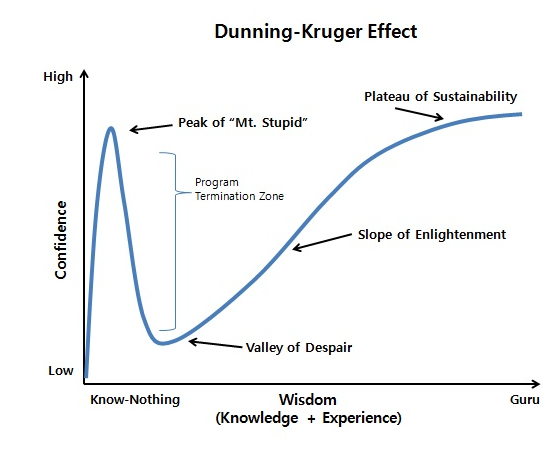Introduction
The Dunning-Kruger effect is a highly prevalent term in academic circles, yet it remains unfamiliar to many, especially those who are just beginning their academic journey. Today, I will share my knowledge to help you better understand this phenomenon and how to avoid falling victim to it. I'm sure that many of you have heard of this effect, but you may not know what it is or how it works. So, let's dive in and explore this topic together.

Understanding the Dunning-Kruger effect can help ease envy towards others and prevent foolish mistakes. It can also provide insight into your own capabilities, ultimately aiding you in becoming a better individual.
What is Dunning-Kruger Effect?
Fundamentally, this effect refers to a person's ability to misjudge their own capabilities. In other words, they may overestimate or underestimate their abilities. This misjudgment can lead to actions that are either incorrect or even dangerous.
Specifically, the Dunning-Kruger effect is named after two psychologists, David Dunning and Justin Kruger. In 1999, they conducted a study that yielded some fascinating conclusions about this phenomenon.
One intriguing observation observation from the study is that it reveals two contrasting trends:
- People with low skills tend to overestimate their abilities.
- People with high skills tend to underestimate their abilities.

I, like many others, have likely fallen into the pitfall of this effect, and I am sure you have too. It can happen to anyone, but it often befalls those who are just starting in a particular field. They tend to realize this as they engage in interviews, start working, or even attend training courses.
How Does It Work?
In essence, it's easy for us to fall into the trap of this effect. To better understand, let's explore a specific example:
Example
I once worked with a colleague who was a new programmer. They had worked for a few different companies and had some experience in coding. However, they lacked experience in object-oriented programming and coding in a larger environment. Nonetheless, they were quite confident that they could excel in their job. This led to them being unable to complete their tasks adequately, and they were eventually let go. The reason was their lack of experience in handling the job, but they failed to realize this until they actually started working.
In the example above, someone with lower skills tended to overestimate not only their own abilities but also the abilities of others, and the frustrating part is that they rarely recognized their mistakes.
How to Avoid Dunning-Kruger Effect?
Never Stop Learning: Continuously expand your knowledge and skills every day as a way to compensate for the vast gaps in understanding in this wide world. This helps you easily recognize that we don't know as much as we might think.
Objectively Self-Assess: Cultivate the habit of objectively evaluating yourself. This fosters true humility, ensuring you never become overconfident in your abilities.
Acknowledge Others' Perspectives: Embrace the viewpoints of others and strive to learn from them. Never assume that you know everything. While you may be highly knowledgeable in one area, you can be quite ignorant in another.
Embrace Adaptation: It's challenging to deny things we don't want to do or are not good at. The best approach is to learn how to adapt, be open, and embrace new experiences.
By incorporating these strategies into your life, you can navigate the Dunning-Kruger effect more effectively, avoid overconfidence, and foster personal growth and development.
Additional Resource
I enjoy reading the blog of this gentleman, and it seems to be a valuable resource: